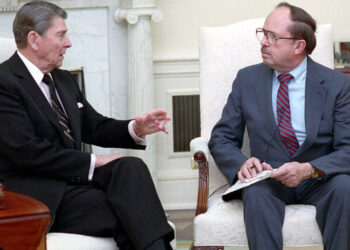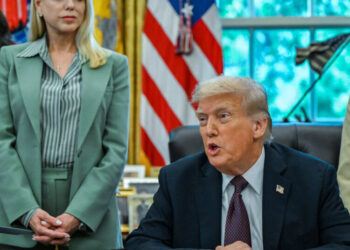While President Trump certainly has supporters who adore him and feel no need to justify that, he survives — and too often prospers — with the crucial help of voters who basically regard him as the lesser of evils.
They tell themselves something like this: Trump has shortcomings, but those are merely mirrors of the corruption and craziness on the other side. Almost any accusation leveled at him is lodged as easily — and often more righteously — against his opponents. In a government of bad apples, he’s no mealier than the rest.
But those claims insist on a symmetry that doesn’t exist. They’re equivalences not merely false but fantastical. They ignore the severity, the prevalence, the consequences of the misconduct in question. Imagine defending a suitor who’s a serial arsonist because the other guy has a jaywalking citation; both bachelors are lawbreakers, after all. That’s the perverse moral arithmetic of more than a few Trump apologists.
I find two of their rationalizations especially preposterous, starting with this:
Trump is merely using his Justice Department as President Joe Biden used his and persecuting opponents in the fashion that Biden did.
That isn’t some random, cherry-picked absurdity. That’s practically every hour of Fox News. Trump’s supposed mimicry of Biden when it comes to politically motivated investigations and prosecutions is more than an article of faith on the right. It’s the dogma that washes Trump’s authoritarianism clean.
And it’s bunk. I don’t recall evidence that Biden ordered the prosecutors who filed charges against Trump to do so. In contrast, Trump’s commandments that Attorney General Pam Bondi and her unctuous underlings go after James Comey, Letitia James and others are a matter of Truth Social record.
Show me where, during Biden’s presidency, you find anything analogous to Trump’s purge of Justice Department lawyers who have failed or might fail to quench his thirst for vengeance. Anything like the series of events by which Erik S. Siebert, the U.S. attorney for the Eastern District of Virginia, was pushed out of his job in September after he hadn’t produced the indictments against Comey and James that Trump so fervently desired.
Trump installed, in Siebert’s place, one of his personal lawyers, Lindsey Halligan, who had zero experience as a prosecutor. She raced to indict Comey before the statute of limitations ran out. That heedless sprint entailed an embarrassment of errors and a mockery of jurisprudence that my Times Opinion colleague David French detailed in a flabbergasting newsletter last week. Try to locate Halligan’s doppelgänger in the Biden administration. Best of luck.
Trump’s launderers insist that partisanship, not wrongdoing, motivated the legal cases against him. To accept that magical thinking, you must erase the photographs of classified documents keeping company with a commode at Mar-a-Lago. You must delete the recording of Trump telling Brad Raffensperger, the top election official in Georgia, to figure out some way to reverse Biden’s victory there in 2020. And you must persuade yourself that Trump’s emphatic proclamations that the 2020 election was being stolen, his haranguing of former Vice President Mike Pence not to certify the election results and his support of Big Lie conspiracy theorists were just politics as usual. That’s a sequence of moral calisthenics so arduous they burn more calories than an hour at CrossFit.
They’re good training for the other juicy rationalization that most infuriates me: Trump’s grifting merely echoes the graft of his predecessor, who was not only a senator, vice president and then president but also the don of the “Biden crime family,” in the cracked MAGA parlance.
It’s true that several of Biden’s relatives prospered in ways that surely traded on his name; that Hunter Biden was an unmitigated ethical calamity; and that his father at best turned a blind eye to much of that and at worst abetted it. But it’s a lie to say that Trump is simply doing likewise — that the main difference between him and other wealth-greasing, self-dealing politicians is the zeal with which Trump haters scrutinize and vilify him.
No, the main difference is how relentless, boundless and unabashed Trump’s monetization and merchandising of his political station are. In an article in The New Yorker in August, David D. Kirkpatrick estimated that Trump’s businesses, business associates and projects tied to him or his family members had pulled in some $3.4 billion during his time in the White House. But even that dollar figure doesn’t do justice to the crass details and to the ancillary ugliness.
Just a few months after his inauguration in January, Trump proudly announced that he’d hold a black-tie dinner at one of his golf clubs for 220 of the biggest spenders on his $TRUMP memecoin; the fat cats who ended up attending the event spent a combined $148 million on the cryptocurrency. He blithely accepted a $400 million luxury plane from the government of Qatar, which of course tendered the gift out of the goodness of Qatari officials’ hearts. Trump and his kin are all over the Middle East all the time, immersed in high-ticket real-estate projects and not so much ignorant of the conflicts of interest as intent on them. Only chumps let such niceties impede them. Champs realize when they’ve been given the key to a gilded till and hasten to rob it.
Some Trump supporters undoubtedly grasp his greed but deem it a small price to pay for a less porous border, for less punishing regulations, for a stand against progressive excess. Others just aren’t paying attention. We political analysts never adjust sufficiently for the percentage of voters who are so busy, so distracted or so disinterested that they have little idea what politicians are really up to — the good, the bad, the blundering, the plundering.
But then there are the voters who respond to Trump’s antics and outrages — whether those involve executive overreach, defiance of Congress, brazen pardons, suppression of dissent — as familiar transgressions in festive new attire. Hardly. They’re more and worse than that. But cynicism and tribal loyalty have a way of replacing discernment with delusion.
For the Love of Sentences
In The Atlantic, Caity Weaver corrected the naïveté of people who dared to suggest that the U.S. government had sketched out a plan for the billions of newly useless pennies and that getting a federal official to describe it should be easy: “Wow — you are talking like a baby angel raised by puppies in a beachfront palace with no right angles, who has never attempted to wrench useful information out of a government agency’s public-affairs officer. I would give anything to spend 30 narcotic minutes in your gumdrop world. Let me take your round little face between my hands and squeeze it tight as I scream this: That’s not how things work with pennies.” (Thanks to Mike Shelton of Sand Springs, Okla., for nominating this.)
In The Guardian, Sarah Dempster marveled at a clog-shod Irish dancer whose movements she experienced as “yodeling for feet: a majestic, preposterous lower-body hysteria.” (Harold Gotthelf, Fords, N.J.)
In The Times, Kelly Karivalis saw a bigger picture — and larger lessons — in the last gasps of brick-and-mortar retail establishments like her local Rite Aid. “Now, I can limp into the store with a broken strappy sandal, desperate for super glue, and find only shingles cream, bedpans and a lopsided Easter basket among infinite rows of bare shelves,” she wrote. “‘EVERYTHING MUST GO,’ a banner reads. Just as the emptying Rite Aid has transcended consumer drudgery and morphed into some sort of void, I, too, can transcend the need for earthly items. What’s ‘essential,’ anyway? Decongestants, or the acceptance that someday everything, even a business that you never even cared about, will cease to exist?” (Barbara Hornick-Lockard, Mechanicsburg, Pa.)
Also in The Times, Dan Fagin marveled at the 60-milligram solar-powered radio tag that is enabling scientists to track the movement across North America of the monarch butterfly, which tends to weigh between 500 and 600 milligrams: “So each tag-bearing migrator making the transcontinental journey is, by weight, equivalent to a half-raisin carrying three uncooked grains of rice.” (Dean Gottehrer, Santa Cruz, Calif.)
And Dwight Garner considered the carnal exuberance communicated by the protagonist of Jan Kerouac’s 1981 novel “Baby Driver,” which has just been reissued: “A lot of ex-cons and addicts and quasi-pimps drag their hairy knuckles through these pages. Sex for her is often just something to do, like a pack of cards kept in her back pocket.” (Nancy DeTine, Buffalo, and Jill Feninger, St. Davids, Pa., among others)
In The Washington Post, Kathleen Parker recognized the toll of trolls, who reserve their nastiest social-media insults for women: “You shrug them off, but over time these ambushes accumulate and congeal into something globular and frightening, like an alien occupation of the psyche that taunts and nibbles away at the human host. Without a strong, healthy ego, it’s a short trip to paranoia, self-doubt and emotional dysfunction.” (Craig Woodward, Guntersville, Ala.)
In his No Mercy/No Malice newsletter, Scott Galloway attributed the anxiety, pessimism and compromised patriotism in young Americans to “adults who enjoyed the shade of trees planted by others but are now clear-cutting forests meant for the next generation.” (Victor Wright, Columbia, S.C.)
And in The Arkansas Democrat Gazette, Philip Martin praised the writer Walter Isaacson’s depictions of the authors of the Declaration of Independence in his new book, “The Greatest Sentence Ever Written,” about the document’s opening words: “He doesn’t carve them into monuments. He lets them breathe as men at work, leaning over a draft, arguing about commas, listening for cadence. You can feel their hope that a sentence might do what armies could not: define a people by the rhythm of a thought. That faith in language, more than any creed, is the American religion: the belief that words, if built well, can hold our contradictions long enough for us to grow into them.” (Nancy Bellhouse May, Little Rock, Ark.)
To nominate favorite bits of recent writing from The Times or other publications to be mentioned in “For the Love of Sentences,” please email me here and include your name and place of residence.
What I’m Watching
Although the seventh and final episode of the first season of “Task” was shown on Oct. 19, I didn’t get around to watching any of the HBO series until this month, when I binged the whole of it on HBO Max. I’m glad I did. Created and principally written by Brad Ingelsby (“Mare of Easttown”), it focuses on an F.B.I. task force, led by Tom Brandis (Mark Ruffalo), that’s looking into several murders and a kidnapping related to the fentanyl trade in rural Pennsylvania. It’s tense, propulsive and at times deeply moving, but I want to single out two virtues beyond those.
One is how well “Task” creates a sense of place, how authentic its evocation of its environs feels. The houses in which its characters live, the rooms through which they walk, the landscapes across which they drive, the clothes they wear, the lines etched into their faces — none of these belong to the usual Hollywood caricature of the embittered outsiders and haunted precincts on the fringes of the American dream.
Additionally, “Task” is as well cast, and well acted, as anything I’ve seen in the past year. Apart from Ruffalo and Martha Plimpton as his F.B.I. supervisor, it forgoes all-purpose celebrity wattage for performers precisely suited to their assignments. As Robbie Prendergrast, the lavishly tattooed outlaw whose mistakes set the plot in motion, Tom Pelphrey oscillates among rage, bafflement and tenderness in an entirely convincing and utterly mesmerizing fashion; Silvia Dionicio is quietly heartbreaking as Tom’s adopted daughter, Emily.
The actors are so committed to their roles and disappear so deeply into their characters that I didn’t realize, until I researched “Task” after finishing it, that one of the F.B.I. investigators was played by Alison Oliver, recently seen as a libidinous member of the ultrawealthy family at the center of the movie “Saltburn,” and that Robbie’s niece, Maeve, was played by Emilia Jones, the young star of the Oscar-winning movie “CODA.” “Task” is a trove of riches that refuse to call attention to themselves.
Retire These Words!
When’s the last time you saw someone clutch his, her, their — or, for that matter, someone else’s — pearls?
I mean in real life, not in a play or a movie. I mean in front of you or in eyeshot of you. And I mean actual pearls, arranged in a strand, hung around a neck, all primed and ready for the clutching. Have you recently witnessed such clutching? Have you ever witnessed it?
It’s funny how some phrases exist mainly or solely for the purposes of metaphor, and it’s unfunny how overused they can become. Pearl clutching is the perfect example. It took JD Vance to make me realize that.
I have more or less come to the conclusion that if this vice president says something, I should distrust, dispute or outright reject it, and last month, he breezily dismissed many people’s disgust over racist comments in a private group chat among Young Republicans as “pearl clutching.”
Less than a week later, Steven Cheung, the White House communications director, clutched hold of the same expression, lashing out at people upset about the demolition of the East Wing: “Losers who are quick to criticize need to stop their pearl clutching.”
There’s a pearls/swine joke to be made here, but instead I’ll note how illuminating Vance’s and Cheung’s vocabulary is. Men in the Trump administration assiduously (and laughably) cast themselves as hypermasculine and anti-elitist. They indulge both those poses when they besmirch pearls, which are luxury items connoting femininity and fussiness.
And they might be distressed by this 2012 report, in the Grammarphobia blog, about the history of pearl clutching as a derogative reference to performative or prudish shock:
The earliest example we’ve found of this figurative usage is from the late ’70s. And it may indicate that it originated in gay slang.
In the February 1979 issue of Off Our Backs, a journal published by a lesbian/feminist collective, the Black writer Sheila Brown described a meeting at which the white members of the collective were accused of racism.
She said she heard gasps and “could see them clutching the pearls they no longer wear.”
From Black lesbian feminists to Vance: What a journey pearl clutching has taken! At this point, it’s an odyssey of overexposure, one that places pearl clutching alongside dumpster fires, clown cars and cat herding in the dictionary of exhausted political put-downs. I recently asked Google for “pearl clutching” references in news sources from mid-November 2024 to mid-November this year, and it found just under 33,000 instances. But it found only about 2,400 instances from the same period five years earlier.
The phrase’s greatest sin, though, is its trivialization of many Americans’ responses to the ugliness of the moment. As I watch Trump and his toadies degrade the presidency and as I behold the erosion of so many ideals, I’m not merely offended. I’m not reaching for imaginary baubles. I’m trying with all my might to hold tight to a strand of hope, a shred of optimism. And I’m heartsick.
“Retire These Words!” is an occasional feature about overused, oddly used, erroneously used or just plain annoying locutions. I previously bemoaned the clichés of political parlance in this edition of the newsletter in October 2022 and in this one in April 2023.
The post The Absurd Asymmetries That Prop Up President Trump appeared first on New York Times.




